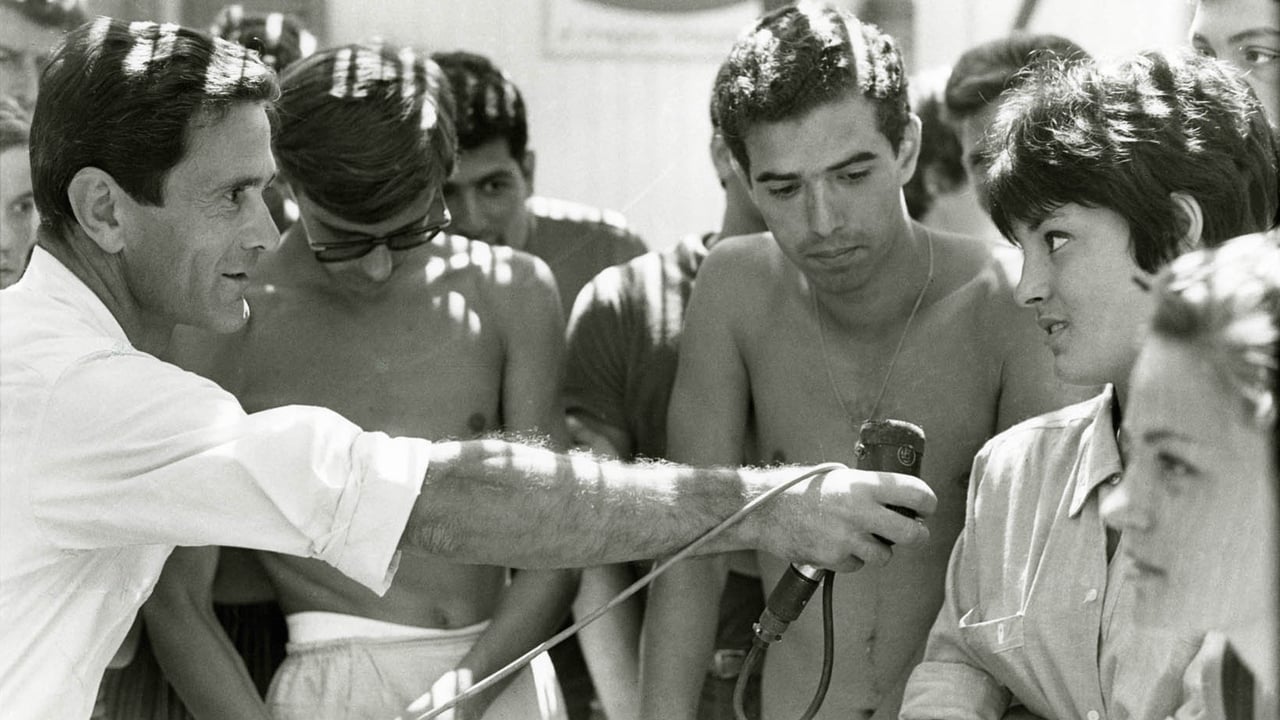Laikals
The greatest movie ever made..!
Pluskylang
Great Film overall
Comwayon
A Disappointing Continuation
Guillelmina
The film's masterful storytelling did its job. The message was clear. No need to overdo.
OliverBagshaw
Pasolini's Comizi D'amore (also known as "Love Meetings") is an interesting documentary. It's execution is modest and admirable: Pasolini, equipped with a microphone, interviews the 1960s public of Italy - ranging from children, teenagers, parents and the elderly to gain a representative perspective - focusing his questions on the subject of sex. Specifically, questions about birth - if the children interviewed understood where babies came from; sexual relationships and marriage - i.e. do sexual issues disappear with marriage; prostitution; gender differences; homosexuality; sexual diseases; etc. These questions and their overall theme attempts to illustrate how Italy, during the 60s, was conservative in their views on sex.The research his film presents is admirable and thorough, as Pasolini interviewed many people from the public around Italy, providing answers that vary depending on location; the north of Italy proving to be more open to sex while the south of Italy was indicating more conservative views. Although the film might not be particularly representative of Italy in the present day, the film does provide an intriguing source for comparison: how the present day view's on sex have changed from the views held in the 1960s.Pasolini's interviewing technique shows signs of sensitive delivery, making sure his questions are never worded awkwardly, never creating discomfort, while also improvising follow-up questions almost instantly to elaborate on an interviewee's response; for the short time these interviewee's are on screen, Pasolini makes sure to get the most out of them. Quite playful at times, this is an intriguing and honest film where views of 1960s youth culture and conservatism are collected - it's definitely an intelligent examination of the 1960 Italian public's views on what is still considered a taboo subject.
AvBaur
In this documentary, Pasolini travels around Italy and interviews random people in public places about their attitudes towards sexuality, marriage, and gender issues. It's fascinating to hear how Italians in the early 1960s felt about these topics, and there are plenty of opinions that seem shocking from a modern perspective. There are people who think that divorce should be illegal (they'd rather have spouses kill each other), parents who find it perfectly normal for 14 year-old boys to lose their virginity with a prostitute, and women who think it's only right that they have less rights and freedoms than men. It's especially interesting to hear the interviewees confess their unabashed disgust towards homosexuals to the secretly gay director.However, I can't help but wonder if it wouldn't have been more interesting to include some interviews that weren't conducted in public places with groups of people standing around. As it stands, the movie gets a bit repetitive after a while and probably would have been more effective with a shorter running time.
Michael_Elliott
Comizi d'amore (1965) *** (out of 4) Pasolini travels around Italy throwing a mic into various ranges of people asking frank and honest questions about sexuality. Various topics ranging from homosexuality, prostitutes, divorce, sexual freedom and even asking kids where babies come from. The type of people range from college students to the rich and poor and to women who normally can't speak openly. I'm sure this film was more of a sensation when originally released but I think it holds up quite well today for several reasons. For one, it's interesting to look back over forty-years ago and see how young people at the times thought about sex but also how the older people back then looked back on the moral and religious rules of their youth. The film also holds up well today because things really haven't changed too much whenever you really break down the groups of people like Pasolini did. I'm not sure is there was a point to this documentary as it seems like the director simply wanted to know what the country felt on certain issues. There's a lot of humor to be found in the film but most of this comes from the answers the children give about where babies come from. The most interesting thing, knowing that the director was gay, is him asking people about homosexuality and the answers they give him. Most people reply with disgust and I kept wondering if the director would crack and say something but he never does. I think the film goes on a bit too long but it's an interesting look at sexuality on moral and religious aspects.
boltinghouc2
I must admit, my anticipation for Love Meetings was exceedingly great. Being familiar with Pasolini's other works, his use of prostitution, sexual situations and perversities as a drive in his filmmaking and writing, I eagerly awaited the viewing of this documentary on the Italian view of sex in the 1960s. However, the film turned out to be fairly disappointing. Rather than focus on the underside of Italian life that Pasolini is so accustomed to, he rather relies upon asking tiresome questions concerning unwed couples and love's purpose in a relationship, spending little time dealing with homosexuality and prostitution. Although Pasolini does present a wide-ranging view of Italy's attitudes towards sex, from the poor Southern farmer to the Northern elitist to the intellectual, his lack of material and interviews on the truly interesting aspects of Italian sexual life presents a somewhat interesting, albeit dated and flawed, picture.

